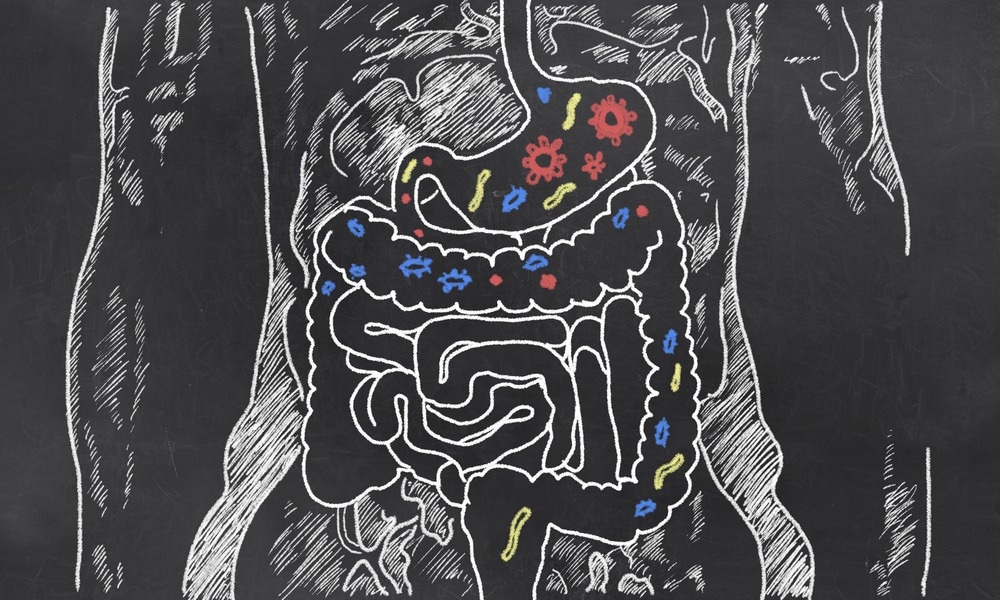According to a study published in Nature, gut bacteria and a diet high in the amino acid tryptophan can protect against pathogenic E. coli, which can cause severe upset stomach, cramps, fever, intestinal bleeding, and renal failure.

Image Credit: T. L. Furrer/Shutterstock.com
The research shows that gut bacteria can convert the amino acid tryptophan, primarily present in animal products, nuts, seeds, whole grains, and legumes, into tiny molecules known as metabolites.
As it happens, some of these metabolites have the ability to attach to a receptor on the surface of gut epithelial cells. This initiates a process that lowers the level of proteins that E. coli use to attach to the gut lining and spread infection. When E.coli is unable to adhere to the intestinal wall and begins to colonize it, the pathogen passes through the body.
The study describes the role of a receptor called DRD2 that was previously unknown in the gut. Other names for DRD2 in the central and peripheral nervous systems are dopamine (neurotransmitter) receptors.
It is actually two completely different areas that this receptor could play a role in, which was not appreciated prior to our findings, and we essentially think that DRD2 is moonlighting in the gut as a microbial metabolite sensor, and then its downstream effect is to help protect against infection.
Pamela Chang, Associate Professor, Department of Microbiology and Immunology, Cornell University
Samantha Scott, a Postdoctoral researcher in Chang’s lab and the study’s first author, said, “Dopamine Receptor D2 Confers Colonization Resistance via Microbial Metabolites.”
Chang, Scott, and associates can now start looking for potential therapeutic targets by analyzing the DRD2 receptor and elements of its downstream pathway, having discovered a particular pathway to aid in preventing E. coli infection.
Since certain pathogenic E. coli do not infect mice, the researchers used mice infected with Citrobacter rodentium, a bacterium that closely resembles E. coli, for the research. Through tests, the scientists discovered that when mice were given a diet high in tryptophan, there was a decrease in pathogen and inflammation signatures of infection and an active immune system.
The mice were then given antibiotics to reduce the number of bacteria in their stomachs, demonstrating gut bacteria's impact. Despite the mice being fed a tryptophan-rich diet, they developed an infection from C. rodentium, indicating that the gut bacteria were necessary to protect them from tryptophan.
Then, they identified three such metabolites that were significantly increased when given a tryptophan diet by running a screen using mass spectrometry to determine the chemical identities of tryptophan metabolites in a gut sample.
Once more, feeding the mice only these three metabolites had the same protective effect as feeding them a complete tryptophan diet based on pathogen levels and inflammation.
Turning around, the scientists employed bioinformatics to determine which proteins (and receptors) might attach to the tryptophan metabolites. They discovered three related dopamine receptors from a lengthy list that belong to the same family.
They were able to identify receptor DRD2 as the one that had the protective effect against infection in the presence of tryptophan metabolites in the lab using a human intestinal cell line.
After determining the receptor and its metabolites, they examined DRD2's downstream pathway in human gut epithelial cells. In the end, they discovered that the activation of the DRD2 pathway hampered the host's capacity to produce an actin regulatory protein.
Actin is necessary for C. rodentium and E. coli to adhere to gut epithelial cells, colonizing and introducing toxins and virulence factors that induce symptoms. Actin polymerization is necessary for them to attach; otherwise, the infection can pass through and clear.
The research uncovered a novel function of the dopamine receptor DRD2 in the gut, which regulates actin proteins and modifies a hitherto unidentified mechanism to stop the spread of harmful bacteria.
Source:
Journal reference:
Scott, S. A., et al. (2024) Dopamine receptor D2 confers colonization resistance via microbial metabolites. Nature. doi.org/10.1038/s41586-024-07179-5